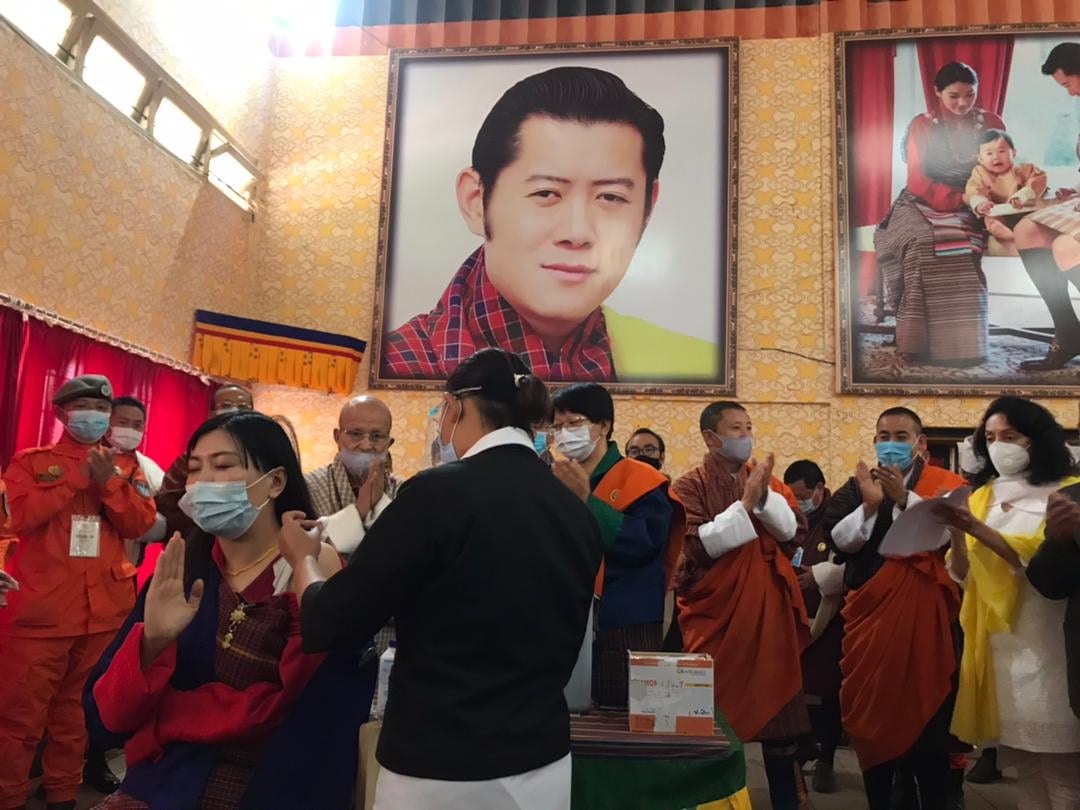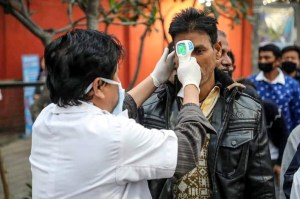Over the last two weeks, Bhutan has been doing something even the wealthiest countries couldn’t manage so far. First, instead of hastily doling out its first batch of AstraZeneca vaccine, they sat on it for two months. Then it took them just about two weeks to vaccinate nearly 95 percent of its eligible adult population.
Despite its harsh weather and rough terrain, Bhutan brought vaccines to even its most vulnerable who couldn’t make it to vaccine centres. All of this, with just 53 doctors on COVID-19 vaccination duty.
Videos by VICE
Bhutan’s steep upward curve on the comparative graph of COVID-19 vaccination drives from around the world gripped everyone.
As the news broke, the world showered praises. Since the beginning of the outbreak, the country has confirmed 934 cases of COVID-19 and one death. There are 57 active cases at the moment.
Government data from 2020 shows that the country has a chronic shortage of healthcare, with only 376 doctors in the total health workforce of nearly 6,000.
For too long, this tiny Himalayan nation’s success was measured on the basis of not an economic index but a philosophical one called Gross National Happiness. Government data from 2020 shows that the country has a chronic shortage of healthcare, with only 376 doctors in the total health workforce of nearly 6,000. Today, the country of 763,000 people—which is a little over the entire population of the American capital city of Washington D.C.—is an unlikely success story.
“[Bhutan’s vaccination drive] was not to make news around the world, but to ensure that we deal with the pandemic in the best manner possible,” Namgay Zam, a senior independent journalist in Bhutanese capital Thimphu, told VICE World News. The worldwide recognition, Zam added, came because nobody expected it from this tiny South Asian country.
“We are seen as this insignificant little country in the world—no expectations at all, and suddenly we’ve achieved what no other country has. We are like the underdog winning the World Cup.”

As major countries such as the U.S., China, India and several European nations struggle with bungled vaccination drives, Bhutan’s success is not accidental. “Bhutan may have a shortage of doctors, but it has never affected our health care system,” said Lhatu Wangchuk, a former Bhutanese ambassador to the United Nations. “Bhutan has always had something to share with the rest of the world. With COVID-19, it was managed on a war footing after recognising the potential devastation that it would have on our small population.”
“Bhutan has always had something to share with the rest of the world.”
“I believe the reason might be that we have not only dedicated health workers but also their services are put to prudent and optimum use compared to the rest of the world,” he added.

A key part of Bhutan’s success story is the desuups, or citizen volunteers, who are a part of the De-suung Integrated Training Programme. The programme, considered the greatest initiative in the country, has seen volunteers from royal and political families, civil servants and youths, among others.
Also called the “Guardians of Peace”, the desuups were responsible for implementing COVID-19 safety protocols such as mask-wearing and social distancing. “They also monitored inter-district travel and collected data. They are truly the unsung heroes,” said Mende Thuji Yangden, a Bhutanese cultural preservation analyst.
“Thousands of Bhutanese became available to be mobilised in various capacities overnight, thanks to this royal initiative.”
Local news reports showed desuups walking for days through snow to take the vaccines to people living in higher altitudes. Desuups also assist the armed forces in various parts of the country in border patrol as well. “Thousands of Bhutanese became available to be mobilised in various capacities overnight, thanks to this royal initiative,” said Zam.
The vaccine outreach also included health workers who had completed the Expanded Programme on Immunization (EPI), which set the tone for a holistic public healthcare system in Bhutan and readied a cold-chain infrastructure for COVID-19 vaccines. Primary healthcare in Bhutan is free of cost.
“The healthcare workers who completed EPI were the primary vaccination providers,” said Yangden. “Doctors were sometimes present in case people had adverse reactions, but our experienced and well-trained health workers were a major advantage to ensuring the success of the first vaccine drive despite a shortage of doctors.”
Zam said that a lot of emphases was given to prevention instead of treatment. “[Especially in a country like ours] with a shortage of expertise as well as facilities,” she said. “I believe we weighed our pros and cons well and charted our path forward informed by research and science.”

In Bhutan, the discussion around COVID-19 vaccination response throws up a word that is rarely associated with such an exercise: compassion. Some political leaders got the first jab to kickstart the campaign, including the country’s prime minister Lotay Tshering, who is a doctor himself and even took to Facebook lives to address FAQs by citizens.
“The idea of serving others before yourself, especially people most in need, is a fundamental concept in Bhutanese culture.”
At the same time, Bhutan’s king Jigme Khesar Namgyel Wangchuck, had very early on announced that he will get vaccinated only once every eligible citizen is vaccinated.
“The idea of serving others before yourself, especially people most in need, is a fundamental concept in Bhutanese culture,” said Yangden. “His decision to get vaccinated later is a symbolic gesture that demonstrates [the king’s] desire to put everyone’s safety before his own.” The king also dolled out several initiatives at this time, such as loan deferrals and royal cash grants to the unemployed and economically affected.
The vaccination drive also gave space for Bhutanese enforcement agencies to observe traditions. For instance, the date of kickstarting the vaccination on March 27 was done through astrological consultations with Buddhist monks. Several visuals from the vaccine drives show monks chanting and lighting lamps. In fact, the first person—a 30-year-old nurse—to be vaccinated was chosen as a woman born in the Year of the Monkey.

There have been anti-vax theories on WhatsApp and social media, added Zam, yet that did not lead to vaccine hesitancy among people. Vaccines are not mandatory in Bhutan. “But we’ve still had a massive turnaround,” said Zam.
Some South Asian governments have come under the scanner for cracking down on the media that criticised its COVID-19 response. In Bhutan, criticism is hard to find.
Some South Asian governments have come under the scanner for cracking down on the media that criticised its COVID-19 response. In Bhutan, criticism is hard to find. A 2014 survey by the Journalists Association of Bhutan showed that out of around 100 reporters across the country, 58 percent find it “unsafe” to cover critical stories. A 2019 survey found that hundreds of journalists are leaving the country because of, among other factors, censorship and threats.
Zam, who previously faced a libel lawsuit for her reporting, and was a part of a landmark case of press freedom in the country, said that this time, journalists had nothing to criticise in the government’s pandemic response. “Our media enjoyed good access to information during the pandemic,” she said. “The government has been transparent and proactive.”
For now, the battle is far from over, as neighbouring countries see an alarming second wave, and India runs out of vaccines for its own people and countries such as Bhutan for second doses. “There is fear of importing a new variant of the virus and questions about whether India will have enough vaccines, particularly second doses, to grant or sell to Bhutan,” said Yangden. Despite the success, Yangden added—in true Bhutanese spirit—“Bhutan will not be safe until our neighbours are too.”
Follow Pallavi Pundir on Twitter.








